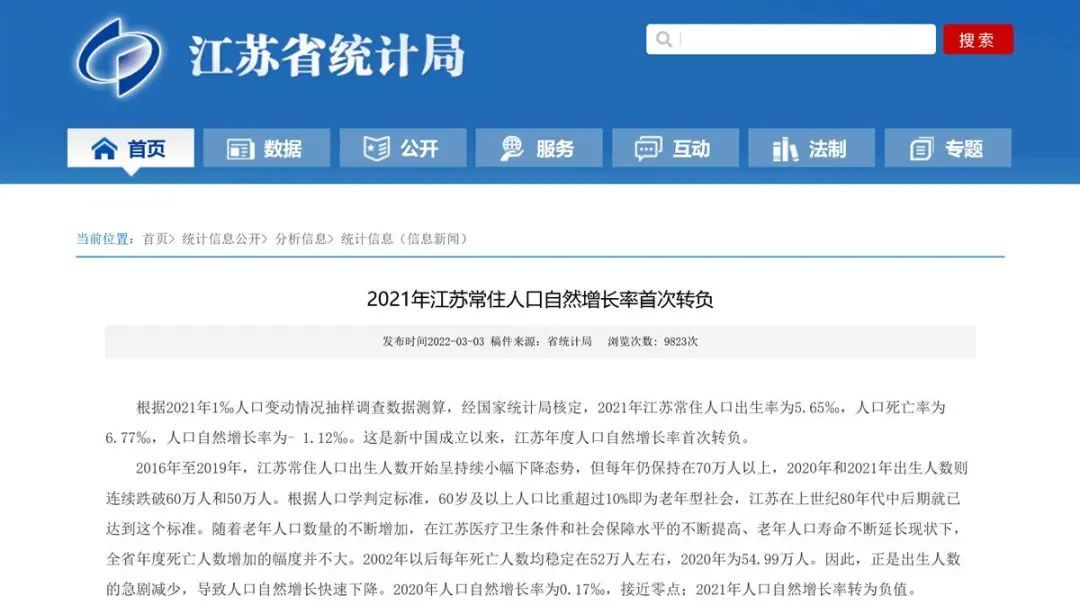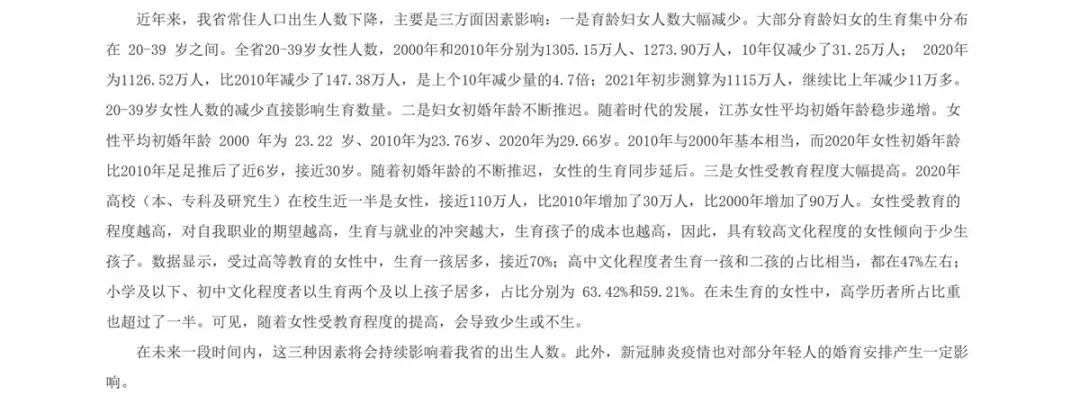Recently, a statistical information released by the Jiangsu Provincial Bureau of Statistics showed that the natural growth rate of the local population in 2021 turned negative for the first time.
Among the three reasons for the decline in the number of births that he summarized, “the education level of women has increased significantly” has caused controversy among netizens. Some netizens expressed that they did not understand why women’s education The degree affects the birth population. In addition, the above three reasons are all directly related to women and also lead to doubts.


Official website screenshot
On March 15, the Jiangsu Provincial Bureau of Statistics said in response to a reporter from Jimu News that it had noticed the relevant disputes. Population experts have analyzed that the social fertility rate is affected by a variety of factors, and these factors do not only affect women. It is not comprehensive enough to attribute the decline in fertility to women.
Netizens questioned the inaccuracy of relevant conclusions
This information, which caused controversy, was published on the homepage of the official website of the Jiangsu Provincial Bureau of Statistics. On March 3, the statistical information titled “The natural growth rate of Jiangsu’s permanent population turns negative for the first time in 2021” shows that the birth rate of Jiangsu’s permanent population in 2021 will be 5.65‰, the population mortality rate will be 6.77‰, and the natural population growth rate will be – 1.12‰.
The article stated that this is the first time that Jiangsu’s annual natural population growth rate has turned negative since the founding of the People’s Republic of China. It was the sharp drop in births that led to a rapid decline in natural population growth.
This information summarizes the main factors that have led to the decline in the number of births in Jiangsu’s permanent population in recent years: the number of women of childbearing age has dropped significantly, the age of women’s first marriage has been delayed, and the education level of women has increased significantly.
The explanation for the third factor is, “The higher the education level of women, the higher the expectations of self-employment, the greater the conflict between fertility and employment, and the higher the cost of having children, so , women with higher education level tend to have fewer children.”
The article concludes after citing relevant statistics, “With the improvement of women’s education level, it will lead to fewer or no children. .”
After the above information was reprinted on the Internet, some netizens questioned: “Is there a causal connection between the level of education and the willingness to have children?” Some netizens found that the three factors summarized in the article are directly related to women. A little puzzled: “It depends on the individual’s wishes, why is the responsibility resting on women?” “There are many reasons that affect fertility wishes.”

On March 15, a staff member of the Jiangsu Provincial Bureau of Statistics said that he had noticed the relevant disputes on the Internet, and the relevant business departments should be consulted for the specific situation.
Experts: Multiple factors affect fertility
Jimu news reporter noticed that in January this year, Ning Jizhe, director of the National Bureau of Statistics, publicly stated that the decrease in births was a major factor in the decline in births. The result of a combination of factors.
In 2021, the number of births in my country will decrease compared with the previous year, and the birth rate will drop. The main reasons include the continuous decrease in the number of women of childbearing age, the decrease in the willingness of young people to have children, and the new crown epidemic also delaying the arrangements for marriage and childbearing of young people to a certain extent.
Ning Jizhe also pointed out that my country’s total population will remain above 1.4 billion for a period of time, and the effect of the three-child policy will gradually emerge.
Ye Ning, a researcher at the Institute of Sociology, Hubei Academy of Social Sciences, analyzed that the factors affecting the social fertility rate are comprehensive, including the level of social and economic development, the level of consumption, the level of residents’ cultural and education, and the level of social security. perfection and other factors.
Some studies have shown that in economically developed places, fertility is usually at a low level, which is in line with the content of demographic transition theory.
The higher the level of social consumption and the higher the cost of raising children, couples who are willing to have children will also avoid having more children. In addition, the high level of social security also makes it easy for people to no longer rely too much on “raising children to prevent old age”, which inhibits people’s willingness to bear children to a certain extent.
Ye Ning told Jimu News reporter that the cultural and educational level of residents is not limited to the level of education, but should also include the influence of the local fertility culture on the residents.
Individual pursuit of career and life, concept of fertility in different regions, local atmosphere about fertility and other factors can all play a role in this level: “For example, some places believe in more children and more happiness.”
The attitude of the state and society towards fertility also affects individuals. This also means that high education does not necessarily lead to low fertility willingness. “More importantly, when these factors affect the fertility rate, it does not only affect women.”
Ye Ning said that childbearing is a common issue for couples of childbearing age, and both husband and wife decisions about childbearing will be affected by the above factors.
Source: Jimu News reporter Zhang Qi